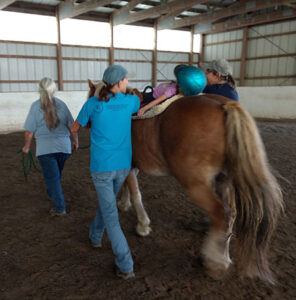From the Ground Up Therapeutic Horsemanship, Inc. offers a range of Equine Assisted Services (EAS), described under our Programs link. The benefit of these programs is grounded in the holistic nature of working with horses, i.e. “holistic” in terms of effects on the body, mind, emotions, and relationships. For example, EAS can improve:
- balance
- motor skills
- coordination
- flexibility
- posture
- muscle tone
- sensory integration
- problem solving
- focus/attention
- communication
- memory
- teamwork
- coping skills
- setting boundaries
- impulse control
- emotion regulation
- self-esteem

Here’s how it works
Interacting with horses provides unique experiences unlike other types of physical, psychological or relationship therapies. There are many ways that our equine “therapists” can affect us to bring about functional improvements and enhance our quality of life. And there is increasing scientific support regarding the horse’s ability to affect the whole person: Biomechanically, neurologically, emotionally and even relationally.
Biomechanically, the horse’s movement is the unique and key component in the mounted (riding) aspect of EAS. The pelvic motion of a horse most closely simulates the human gait and cannot be replicated in any other therapy or on any equipment. While riding, the horse moves the rider’s body in a three-dimensional, rhythmic, repeatable manner that the rider may be unable to do on his/her own. By this process, the rider with physical disabilities develops core strength and improves balance, flexibility, postural control and range of motion.
Neurologically and cognitively, the horse’s three planes of movement stimulate the vestibular (balance “sense”) and proprioceptive (body awareness and spatial orientation) systems of the body. The input from the horse’s movement on these two systems stimulates brain function and rehabilitation, enhancing normal developmental processes like motor planning and sensory integration (ability to process and organize information from the senses). The benefits can include improved learning, communication and attention.
On an emotional level, and with implications for interpersonal relationships, forming a bond with another living creature can have powerful results, including reduction of anxiety and depression, healing old wounds and creating new, positive experiences. Horses are very intuitive, mindful and accepting animals. They sense our mood and emotions and clearly reflect that information back to us using non-verbal communication. Their intimidating size instills confidence, mutual respect, trust and boundaries in all who work with them on the ground or in the saddle. Interacting with horses can teach those with emotional and behavioral problems to trust and care for another creature in a nurturing manner. The ability to guide (in riding or on the ground) and partner with a large, responsive animal offers an increase in self-esteem and independence. And working with horses on the ground in a group setting provides benefits in social skills, teamwork, boundaries and self-discovery.

